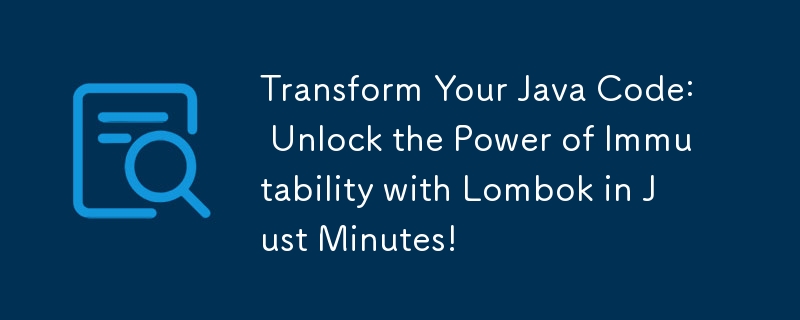转变您的 Java 代码:利用 Lombok 在短短几分钟内释放不变性的力量!
- WBOYWBOYWBOYWBOYWBOYWBOYWBOYWBOYWBOYWBOYWBOYWBOYWB原创
- 2024-08-26 06:35:31928浏览

为什么使用不可变类?
不可变类是有益的,因为它们本质上是线程安全的,易于推理,并且可以防止对象状态的意外更改。不可变对象的状态在创建后无法修改,这使其成为一种有价值的设计模式,尤其是在多线程环境中。
创建不可变类的传统方法
考虑以下 Employee 类:
final class Employee {
private final long id;
private final String name;
private final double salary;
public Employee(long id, String name, double salary) {
this.id = id;
this.name = name;
this.salary = salary;
}
public long getId() {
return id;
}
public String getName() {
return name;
}
public double getSalary() {
return salary;
}
}
采用这种传统方法:
- 该类被标记为 Final 以防止子类化。
- 所有字段都是私有且最终的,确保它们在初始化后无法更改。
- 仅提供 getter 方法来访问字段值。
虽然这种方法效果很好,但它涉及为构造函数、getter 编写样板代码,有时还需要为 equals、hashCode 和 toString 方法编写样板代码。
使用 Lombok 消除样板文件
Lombok 可以大大减少您需要编写的代码量。以下是如何使用 Lombok 实现相同功能的方法:
import lombok.AllArgsConstructor;
import lombok.Getter;
@AllArgsConstructor
@Getter
final class Employee {
private final long id;
private final String name;
private final double salary;
}
该版本使用Lombok注解自动生成构造函数和getter:
- @AllArgsConstructor 生成一个以所有字段作为参数的构造函数。
- @Getter 为每个字段生成 getter 方法。
使用 @Value 进一步简化
Lombok 的 @Value 注释是一个更强大的替代方案,它结合了多个功能来创建不可变的类:
import lombok.Value;
@Value
class Employee {
long id;
String name;
double salary;
}
使用@Value,Lombok 会自动:
- 使课程进入决赛。
- 默认将所有字段设为私有和最终。
- 生成一个全参数构造函数。
- 为所有字段生成 getter。
- 实现 equals、hashCode 和 toString 方法。
这将您的类定义简化为仅包含字段,并自动生成所有必要的代码。
使用@With处理字段更新
不可变对象不允许修改其状态。但是,在某些情况下,您可能需要创建对象的修改副本,例如更新员工的工资。如果没有 Lombok,这可能看起来像:
@Value
class Employee {
long id;
String name;
double salary;
}
class Main {
public static void main(String... args) {
var emp = new Employee(1L, "Aman", 10_000.0);
emp = updateSalary(emp, 12_0000.0);
}
public Employee updateSalary(Employee emp, long newSalary) {
return new Employee(emp.getId(), emp.getName(), newSalary);
}
}
这很简单但很乏味,特别是在处理具有许多字段的类时。
Lombok 的 @With 注释简化了这一点:
import lombok.Value;
import lombok.With;
@Value
class Employee {
long id;
String name;
@With double salary;
}
class Main {
public static void main(String... args) {
var emp = new Employee(1L, "Aman", 10_000.0);
emp = updateSalary(emp, 12_0000.0);
}
public Employee updateSalary(Employee emp, double newSalary) {
return emp.withSalary(newSalary);
}
}
@With 注解生成一个方法,该方法返回类的新实例,并更新指定字段,其余部分保持不变。
最终的解龙目版本
我们的 Employee 类的 de-lomboked 版本(即 Lombok 在后台生成的内容)将如下所示:
final
class Employee {
private final long id;
private final String name;
private final double salary;
public Employee(long id, String name, double salary) {
this.id = id;
this.name = name;
this.salary = salary;
}
public Employee withSalary(double salary) {
return this.salary == salary ? this : new Employee(this.id, this.name, salary);
}
public long getId() {
return this.id;
}
public String getName() {
return this.name;
}
public double getSalary() {
return this.salary;
}
@Override
public boolean equals(final Object o) {
if (o == this) return true;
if (!(o instanceof Employee)) return false;
final Employee other = (Employee) o;
if (this.getId() != other.getId()) return false;
final Object this$name = this.getName();
final Object other$name = other.getName();
if (this$name == null ? other$name != null : !this$name.equals(other$name)) return false;
return Double.compare(this.getSalary(), other.getSalary()) == 0;
}
@Override
public int hashCode() {
final int PRIME = 59;
int result = 1;
final long $id = this.getId();
result = result * PRIME + (int) ($id >>> 32 ^ $id);
final Object $name = this.getName();
result = result * PRIME + ($name == null ? 43 : $name.hashCode());
final long $salary = Double.doubleToLongBits(this.getSalary());
result = result * PRIME + (int) ($salary >>> 32 ^ $salary);
return result;
}
@Override
public String toString() {
return "Employee(id=" + this.getId() + ", name=" + this.getName() + ", salary=" + this.getSalary() + ")";
}
}
使用 Lombok 实现不变性时的常见陷阱
虽然 Lombok 简化了不可变类的创建,但请务必注意一些潜在的陷阱:
- 可变集合:如果您的类包含可变集合(如 List 或 Map),Lombok 的 @Value 注释将无法保护您免受对这些集合的修改。考虑使用不可变版本,如 Collections.unmodifyingList 或 List.of() 进行初始化。
- 复杂对象:如果您的类字段是本身可变的复杂对象,则类的不变性会受到损害。确保所有字段都是原始的、不可变的对象,或者被正确封装以防止突变。
性能考虑因素
虽然不变性提供了显着的好处,但考虑性能影响也很重要,特别是在涉及频繁更新的场景中:
- 内存使用情况: 每次需要更改时创建新实例可能会导致更高的内存使用量。然而,为了线程安全和降低复杂性的好处,这种权衡通常是值得的。
- 垃圾收集: 创建多个短期对象会给垃圾收集器带来额外的压力。确保您的应用程序的内存管理针对此类场景进行了优化。
结论
Lombok 的 @Value 和 @With 注释提供了一种强大而简洁的方法来在 Java 中创建不可变类,消除了对样板代码的需要,并使您的代码更具可读性和可维护性。通过利用这些注释,您可以专注于应用程序的逻辑,而不是类设计的机制。
以上是转变您的 Java 代码:利用 Lombok 在短短几分钟内释放不变性的力量!的详细内容。更多信息请关注PHP中文网其他相关文章!

